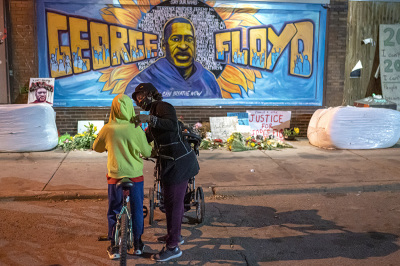One year anniversary of George Floyd's death: 3 biblical facts

On May 25, 2020, George Floyd died in police custody in Minneapolis, Minnesota. The medical examiner later ruled his death a homicide. On April 21, 2021, Officer Derek Chauvin was found guilty on three murder and manslaughter charges and is awaiting sentencing.
Mr. Floyd’s tragic death one year ago marked our nation and still does today.
Several members of his family met in Washington, DC, with President Biden, House Speaker Pelosi, and other lawmakers. The NAACP held a moment of silence at 9:29 a.m. on its Facebook page to mark the nine minutes and twenty-nine seconds Derek Chauvin knelt on Mr. Floyd’s neck.
Shareeduh Tate, cousin to Mr. Floyd and president of the George Floyd Memorial Foundation, told CNN that the family feels uplifted by the racial reckoning, the conviction of Mr. Chauvin, and the federal indictment of Mr. Chauvin and the other three officers involved in Mr. Floyd’s death.
A solidarity march and rally in Dallas, Texas, marked the one-year anniversary of Mr. Floyd’s death. A free concert in Mr. Floyd’s memory was aired by the Pacific Symphony in Orange County, California. Black and white congregations in Minneapolis have been partnering across the last year to serve the city.
However, violence and divisions persist in our land.
There were at least twelve mass shootings in the US last weekend. There was a shooting today near George Floyd Square in Minneapolis. Deep and wide divisions over racism remain in our country.
On this tragic anniversary, we should remember three biblical facts:
1. Racism is sin
Scripture is clear: “God shows no partiality” (Acts 10:34). To the contrary, “There is not Greek and Jew, circumcised and uncircumcised, barbarian, Scythian, slave, free; but Christ is all, and in all” (Colossians 3:11). When we hate someone God loves, we sin against them and against him.
2. We must do all we can to defeat racism and promote equality
Racism in America is both tragic and persistent. (For more, see my article, “What does the Bible say about racism?”). Jesus called us to “love one another: just as I have loved you, you also are to love one another” (John 13:34). His best friend reiterated: “If God so loved us, we also ought to love one another” (1 John 4:11).
We cannot love someone unless we work for their best. In the case of racism, this means using our influence and means to promote the equality of all people, remembering that “God loves each of us as if there were only one of us” (St. Augustine).
3. We need each other
The Lord said of the first human, “It is not good that the man should be alone” (Genesis 2:18). God created humans to need other humans. We are to “bear one another’s burdens, and so fulfill the law of Christ” (Galatians 6:2). God’s will is “that there may be no division in the body, but that the members have the same care for one another. If one member suffers, all suffer together; if one member is honored, all rejoice together” (1 Corinthians 12:25–26).
To experience our best future, we must experience it together. Frederick Buechner noted: “Your life and my life flow into each other as wave flows into wave, and unless there is peace and joy and freedom for you, there can be no real peace or joy or freedom for me. To see reality—not as we expect it to be but as it is—is to see that unless we live for each other and in each other and through each other, we do not really live very satisfactorily; that there can really be life only where there really is, in just this sense, love.
“This is not just the way things ought to be. Most of the time it is not the way we want things to be. It is the way things are. And not for one instant do I believe that it is by accident that it is the way things are.”
Will you “live very satisfactorily” today?
Originally published in the Denison Forum.
Adapted from Dr. Jim Denison’s daily cultural commentary at www.denisonforum.org. Jim Denison, Ph.D., is a cultural apologist, building a bridge between faith and culture by engaging contemporary issues with biblical truth. He founded the Denison Forum on Truth and Culture in February 2009 and is the author of seven books, including “Radical Islam: What You Need to Know.” For more information on the Denison Forum, visit www.denisonforum.org. To connect with Dr. Denison in social media, visit www.twitter.com/jimdenison or www.facebook.com/denisonforum. Original source: www.denisonforum.org.




























